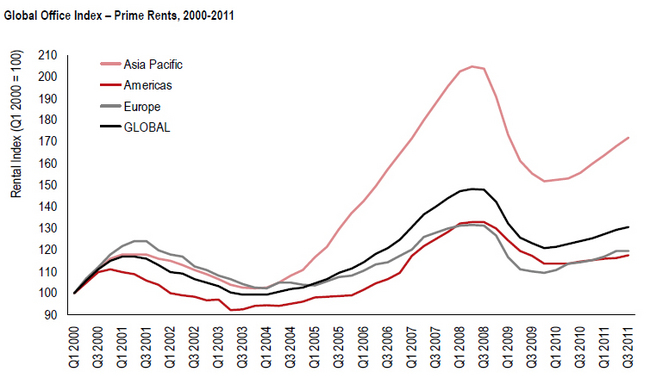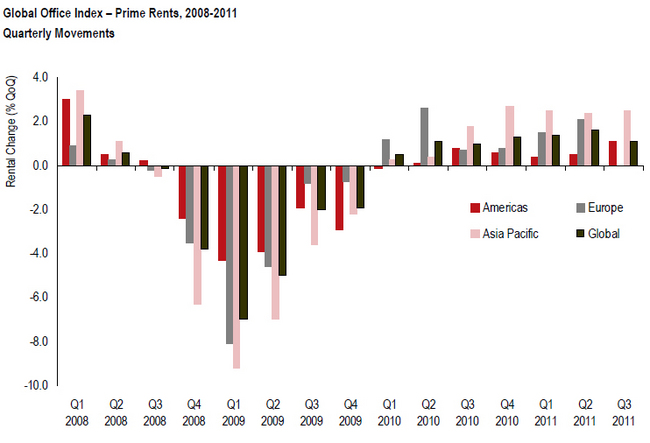The WPJ
THE WORLD PROPERTY JOURNALReal Estate Facts Not Fiction
Commercial Real Estate News

Asia Pacific Enjoys Highest Global Office Rental Growth in Q3; Silicon Valley Rates Spike 14%
Commercial News » Commercial Real Estate Edition | By Michael Gerrity | November 10, 2011 9:32 AM ET
According to Jones Lang LaSalle's new Global Office Index, prime office rents across 81 global markets increased by a further 1.1 percent during third quarter 2011 despite corporations delaying real estate decisions and facing renewed pressure to drive down costs in the face of economic volatility in Europe and the United States.
Asia Pacific office markets experienced the highest rental growth of 2.5 percent quarter-on-quarter. The Americas followed with an increase of 1.1 percent in Q3. However, economic concerns in Europe have weighed down on markets and growth has come to a virtual halt in that region, from 2.1 percent in Q2 to 0 percent in Q3.
The firm's new Index shows this was the seventh consecutive quarter that prime rents have risen globally, reflecting an 8.2 percent uplift since the bottom of the market in fourth quarter 2009 and a 5.5 percent increase year-on-year.
Office rents rose further in most markets in Asia Pacific in quarter three, although at a slower rate than previous quarters. Of the 27 featured office markets, 18 saw advances in net effective rents; for the remainder, rents either stabilized or recorded small residual declines. Aggregate rental growth was largely similar to the previous quarter, with an average quarter-on-quarter increase across the region of 2.5percent, as stronger growth in some Australian cities helped offset weaker behavior in Asia. In Q2, the quarterly rental uplift averaged 2.4 percent.
Seven out of ten cities in the Global Office Index for quarter three were in Asia Pacific; two were in South America and one the United States.
Dr Jane Murray, Head of Research, Asia Pacific at Jones Lang LaSalle tells the World Property Channel, "The picture across Asia Pacific is diverse, reflecting varying conditions within markets in terms of occupier demand, available stock, landlord expectations and local economic drivers. We expect rents to increase in most markets over the short term, although Hong Kong and Singapore may witness some softening given their greater exposure to global economic conditions, while a few other laggards are also likely to see either no growth or some residual rental declines. Rental growth of up to 25 percent is predicted across the region for 2012, with the strongest uplifts likely to be seen in markets such as Beijing and Jakarta."
Key findings of Jones Lang LaSalle's Global Office Index include:
- Real estate markets are diverging, with emerging markets in the BRIC economies demonstrating strong year-on-year performance, with increases in Beijing (+50.6 percent), Moscow (+41.2 percent), Shanghai (+23.7 percent) and Sao Paulo (+20.4 percent). Other Asia Pacific markets that registered positive growth included Jakarta (+48 percent), Hong Kong (+20.6 percent) and Manila (+20.9 percent).
- The ongoing strength of the global technology sector meant that Silicon Valley (+60 percent), Bangalore (+19.7 percent) and San Francisco (+17.1 percent) also had positive rental performance. Equally, demand from the commodities sector supported strong year-on-year growth in Perth (+26.9 percent).
Looking ahead to 2012, Jeremy Kelly, Director in Jones Lang LaSalle's Global Research team and author of the firm's Global Market Perspective which has just been released, commented: "We continue to expect positive rental growth in major prime office markets during 2012. Most major markets are expected to see at least single-digit growth, with some markets such as Beijing, Tokyo, San Francisco and Toronto having the potential to outperform in 2012."
He added, "Despite signs of a deceleration in office leasing activity across the major international business hubs, the average global office vacancy rate of 13.8 percent is now the lowest in two years. The prime leasing markets in advanced economies are fairly tight and the supply pipeline remains very low. In this context, we believe that markets are well placed to resume their growth pattern once a degree of confidence resumes."


Sign Up Free | The WPJ Weekly Newsletter
Relevant real estate news.
Actionable market intelligence.
Right to your inbox every week.
Real Estate Listings Showcase
Related News Stories
Commercial Real Estate Headlines
- U.S. Commercial Mortgage Delinquencies Rise in Q2, CMBS Loans Lead the Surge
- Tokenization-Focused Real Estate Investment Bank Announced
- Commercial Cap Rates Edge Lower in U.S., Hinting at Market Turn
- WPV Targets New $6 Trillion Digital Real Estate Tokenization Opportunity
- $1 Trillion in Data Center Development Underway Through 2030
- WORLD PROPERTY VENTURES: The 'Anti-VC' of Real Estate Plans Major Capital Raise
- Multifamily Sector Enjoys Record Absorption in U.S. as Supply Slows, Vacancies Drop
- Employee Back-to-Office Attendance Surges in U.S.
- Phnom Penh Commercial Property Sectors Face Crosswinds in 2025
- World Property Bank Announced to Capitalize on Coming Trillion-Dollar Tokenization Boom
- REAL ESTATE PREDICTIONS: Decentralized Events Contract Exchange in Development
- U.S. Architecture Billings Improve Slightly in May
- Tokyo Office Demand Spills into Non-Core Wards in 2025
- AI Hyperscalers Drive Record Data Center Leasing in Early 2025
- Commercial, Multifamily Mortgage Debt in U.S. Hits Record $4.81 Trillion in Early 2025
- U.S. Multifamily Market Rebounds in Early 2025
- U.S. Office Market Experiences Historic Conversion Shift
- New York City Enters New Era of Office-to-Residential Conversions
- World Property Ventures Plans New Capital Raise
- U.S. Commercial Real Estate Lending Rebounds Sharply in Early 2025
- U.S. Multifamily Housing Confidence Declines in Early 2025
- Asia Pacific Commercial Investment Holds Steady in Early 2025
- Carnival Plans New Miami Headquarters Spanning Over 600,000 Square Feet
- Hong Kong Property Investors Take a Wait-and-See Approach Due to U.S. Tariffs
- U.S. Multifamily Buyer and Seller Sentiment Improves in Early 2025
- One Trillion Dollars of America's Commercial Property Loans Mature in 2025
- U.S. West Coast Dominates Self Storage Demand
- Phoenix, Orange County and Inland Empire Emerge as Leading U.S. Industrial Markets
- U.S. Mega Distribution Centers Leasing Activity Grew in 2024
- U.S. Commercial Borrowing to Increase to $583 Billion in 2025, Up 16 Percent Annually
- Demand for U.S. Life Sciences Space Spikes 28 Percent Annually in Late 2024
- Multifamily Property Sector in America Rebounding
- Asia Pacific Commercial Property Investment Spikes 23 Percent in 2024
- U.S. Commercial Property Market Primed for Growth in 2025
- Architecture Industry Sees Mixed Signals as 2025 Approaches
- Global Data Center Demand Spikes in 2025
- 2025 Prediction: U.S. Commercial Investment Recovery Expected to Gain Traction
- Holiday Retail Sales for 2024 to Hit Record $1 Trillion
- Tech, AI Industries Drive Largest Share of Office Leasing Activity in U.S.
- Commercial Real Estate Lending in U.S. Enjoys Strong Growth in Q3
Reader Poll
Marketplace Links
This website uses cookies to improve user experience. By using our website you consent in accordance with our Cookie Policy. Read More







